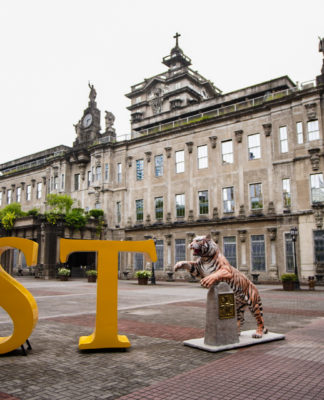THE LIFE and teachings of St. Thomas Aquinas may soon be included in the curriculum of UST.
Philosophy department chair Paolo Bolaños has proposed to the Office of Academic Affairs to include a course on the life of St. Thomas Aquinas to be “at par with Catholic universities teaching more humanities courses.”
“The approach of the Department of Philosophy will be a bit different from Institute of Religion because we are not simply going to focus on his theology,” Bolaños said.
Aquinas’ five-way argument on the existence of God or the Quinque Viae from the Summa Theologica, his most significant work, is already included in the syllabus for introduction to Theology.
The philosophy of St. Thomas Aquinas, meanwhile, consists of his principles on Metaphysics or Cosmology, Theory of Knowledge, Theory of Education, Theory of Human Being or Philosophical Anthropology, Theory of Reality, and Theodicy or Theory of God.
In the curriculum of the Ateneo de Manila University, humanities subjects consist of 42 units—12 units each of Philosophy and Theology, and other units in Literature, English, and a modern foreign language like French, Italian, Spanish, Portugal, Korean, or Japanese.
According to Prof.Mark Joseph Calano of Ateneo’s department of Philosophy, the curriculum operates within the “artes liberales.”
“Even the philosophy courses operate within certain principles of the SpEx (Spiritual Exercises of St. Ignatius). It begins with six units of the Philosophy of the Human Person, three units of Philosophy of Religion, and three units of the Foundations of Moral Value. These are the core Ateneo courses and they are consciously phenomenological,” Calano said in an e-mail to the Varsitarian.
Bolaños said his departmet proposed three subjects with nine units: Introduction to the Philosophy of St. Thomas Aquinas, Philosophical Anthropology, and Ethical Systems.
However, the titles are still tentative as the department is still in the process of reviewing the K to 12 schme of the Department of Education.
In the new basic education scheme, Logic, one of the philosophical subjects in the university-wide curriculum, will be transferred to high school level while the new subjects proposed will be taught to first-year college students.
He added that the department was still laying down the specific themes in Aquinas’ philosophy to be discussed in the course. Only Philosophy instructors with master’s degrees will be qualified to teach the subjects.
“It is important to present him in a comprehensive way,” Bolaños said. “The main purpose of that is to introduce the students to the history of philosophy to the basic branches of philosophy. And the second part of that is to feature the basic and most useful aspects of the works of St. Tomas Aquinas.”
After obtaining the approval of Academic Affairs, the proposal will be presented to the Academic Senate and to the Rector, he said.
Contribution to Thomasian identity
In the context of university education, the department proposed to fill what it thought were gaps in Thomasian education, Bolaños said.
“The fact that the name of Thomas Aquinas is used as the name of the University tells us a lot of the origin of the University. Its origin [is] in the humanities,” he said.
The mission statement of UST, indicating that the ideas of St. Dominic de Guzman and the teachings of St. Thomas Aquinas are essential to the development of “competent and compassionate professionals,” implies that philosophy subjects are also needed, Bolaños noted.
St. Thomas, a Dominican friar, and the Church’s foremost theologian, was canonized in 1323. Pope Pius V declared him a Doctor of the Church. His feast day is celebrated on Jan. 28.
The department also intends to address how people think of St. Thomas Aquinas, who is often regarded as a porvayer of dogma.
Bolaños said the department was unsure of how the faculties and colleges would react to the proposal, particularly on the number of units.
“The trend today is to cut down on the humanities subjects which I think is quite dangerous,” he said. “The concept of university itself is grounded in humanities.”
The role of the University to produce holistic and competent individuals “attuned to human sensibility” with “a sense of culture,” not just with technical knowledge, he added.
“The question of Thomasian identity is something everybody is aware of. But not everyone has a ready answer to it,” Bolaños said.

















